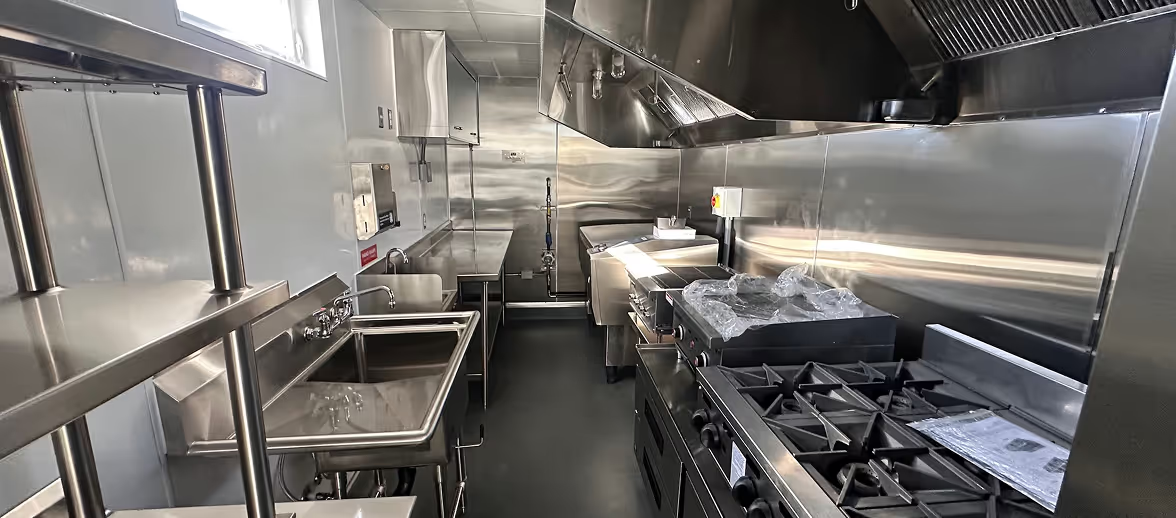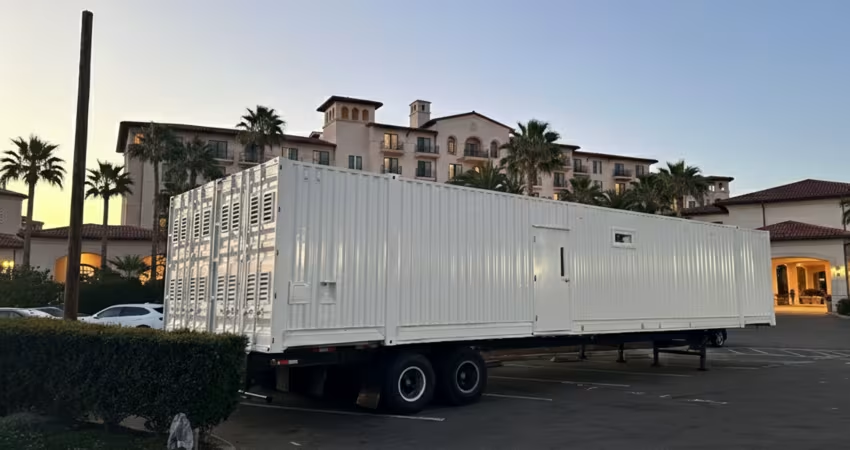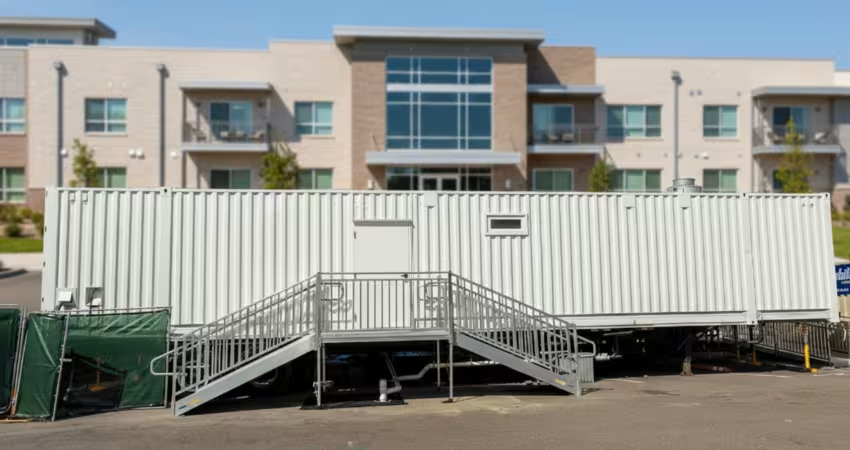%2520(2).avif)
Introduction
For hotels, resorts, and large-scale food operators, uninterrupted food service is non-negotiable even during renovations, expansions, or unexpected kitchen closures. Temporary kitchens bridge the gap, but the choice between a retrofitted kitchen trailer and a purpose-built mobile modular kitchen affects more than daily operations. It impacts compliance, guest satisfaction, and overall profitability.
At first glance, both options may appear similar. Yet retrofitted trailers, often converted from used vehicles, are a low-cost, short-term fix that often come with compliance issues, limited capacity, and reliability risks. In contrast, mobile modular kitchens are engineered specifically for hospitality and high-volume foodservice, built to meet code, scale with demand, and safeguard revenue.
Major hotel renovations typically occur every 7 to 10 years, with kitchens closed for 3 to 9 months during upgrades. Because these closures directly affect food operations, the type of temporary kitchen you choose can determine whether you stay compliant, operational, and profitable throughout the renovation.
This article compares both options across cost, ROI, compliance, and flexibility, and explains why Mobile Culinaire’s mobile modular kitchens deliver greater reliability and long-term value for hospitality operators.
Understanding the Two Options
Retrofitted Kitchen Trailer Rental
A retrofitted trailer is typically a trailer converted into a kitchen trailer. They appeal to operators seeking the lowest upfront price, often used for food trucks, short-term pop-ups, or festivals.
But in hospitality contexts, their flaws quickly emerge:
- Poor design & quality: Inefficient layouts, limited storage, weak AC, and poor ventilation frustrate staff and create unsafe, uncomfortable working conditions.
- Low reliability: Lightweight, low-grade equipment breaks down easily, driving up repair costs and downtime.
- Compliance challenges: Built as makeshift kitchens, retrofits often fail inspections, forcing costly retroactive upgrades before approval.
- Complex deployment: Minimal documentation, patchy vendor support, and tricky hookups delay installation and frustrate operators.
While they may look affordable, these trailers often become expensive liabilities in mid- to long-term hospitality projects.
Mobile Modular Kitchen Rental
A mobile modular kitchen rental is a purpose-built, high-performance facility engineered from the start for commercial foodservice. Unlike retrofits, these units are designed to meet code, optimize workflows, and sustain hospitality-grade volume. They arrive fully equipped and are compliant with the FDA Food Code and local inspection requirements from day one.
Key Features include:
- Turnkey kitchen → delivered fully equipped with commercial appliances, HVAC, fire suppression, and complete MEP systems.
- Easy & quick installation → standardized hookups for water, power, and waste; minimal site prep required.
- Commercial-grade quality → permanent-kitchen finishes, weather-resistant construction, and heavy-duty durability.
- Code compliant → built to meet or exceed local health and building codes; third-party inspected for approval.
- Functional design → ergonomic layouts, workflow-optimized zones, and ample cold/dry storage.
%2520(1).avif)
Cost Comparison: Retrofitted vs. Mobile Modular Kitchen Rentals
Upfront Rental Price vs. Total Cost
On paper, retrofitted kitchen trailers look cheaper. Monthly rental rates typically fall between $5,000 and $20,000, reflecting their limited equipment and smaller capacity. But once you account for transportation ($1,500–$3,000), retrofitting upgrades ($10,000–$20,000), and code compliance modifications ($5,000–$15,000), the “savings” quickly disappear. Local authorities may also require additional plumbing, electrical, or fire-safety upgrades before granting permits, delaying service and inflating costs.
By contrast, mobile modular kitchens start in the $8,000–$25,000 per month range. For complex hospitality projects requiring multiple units, such as prep kitchens, dishwashing trailers, and refrigeration support, monthly rental rates can reach $25,000–$50,000+, reflecting the scale and capability of these facilities. While more expensive upfront, these kitchens arrive inspection-ready, eliminating costly delays and hidden expenses.
Setup & Delivery Fees
Delivery and installation vary by site and scope. Retrofitted trailers, being smaller, often cost $1,000–$5,000 to deliver and install. Mobile modular kitchens, however, may require cranes, forklifts, or proper site prep, which can push installation costs to $10,000–$20,000 or more. The difference reflects not just size but also the level of infrastructure being delivered: a purpose-built commercial kitchen versus a converted trailer.
Maintenance, Repairs, and Insurance
The patchwork construction of retrofitted trailers makes them prone to breakdowns and unpredictable repairs, often adding $500–$2,000 per month to operating costs. Insurers may also raise premiums if fire suppression or ventilation systems don’t meet NFPA 96 standards.
Mobile modular kitchens, built with new infrastructure and standardized safety systems, are more reliable, easier to insure, and carry predictable maintenance costs. In many cases, insurance premiums are 10–20% lower compared to retrofits.
Utilities & Operating Costs
Operators should budget $500–$1,500 per month for utility hookups (gas, water, electricity). Retrofitted trailers often increase operating costs due to non-standard layouts and less efficient equipment, which add labor time and energy waste. Mobile modular kitchens, by contrast, are equipped with ENERGY STAR appliances and ergonomic designs** that lower utility consumption and improve staff productivity — advantages that compound over long projects.
ROI Over Time
When evaluating return on investment, mobile modular kitchens consistently outperform retrofits for hospitality operators. Consider a hotel renovation lasting 9 months: retrofitted trailers may look cheaper upfront, but compliance delays or breakdowns could result in $250,000+ in lost revenue from interrupted foodservice. Mobile modular kitchens, though more expensive month to month, deliver durability, efficiency, and continuous uptime, protecting revenue streams and guest satisfaction over the full project cycle.
Short-Term Affordability vs. Long-Term Value
Retrofitted trailers appeal to operators with short-term needs and budgets under $10,000 per month. But hidden issues like failed inspections ($2,000–$5,000 in fixes), permit hurdles, or breakdowns ($1,000+ repairs) often erode those savings.
Mobile modular kitchens, while starting at a higher monthly cost, provide compounding advantages: faster approvals, lower downtime, stronger energy efficiency, and predictable performance. Over the course of a 6–12 month hospitality project, these advantages translate into a clearer ROI and greater peace of mind.
Hidden Costs and Transparency
With retrofitted trailers, operators frequently encounter surprise expenses ranging from electrical rewiring ($5,000–$8,000) to fire-suppression retrofits ($3,000–$7,000). These costs are unpredictable and disruptive.
Mobile modular kitchens, built to FDA Food Code standards from day one, eliminate those risks. Their transparent cost structure enables hospitality operators to budget confidently and avoid unpleasant mid-project surprises.
.avif)
Why Mobile Modular Kitchens Are Built for Hospitality
Designed Specifically for Hospitality Operations
Hotels, resorts, and event venues require kitchens that can handle both daily guest dining and high-volume banquets, weddings, and conferences. Retrofitted kitchen trailers struggle here: their layouts are cramped, their equipment is scaled for short-term, small-scale use, and staff often face inefficiencies that slow down service.
Mobile modular kitchens, by contrast, are purposely designed for hospitality needs. With professional-grade appliances, ergonomic layouts, and zone-based workflows, staff can prepare meals efficiently and safely, even under peak demand. This means faster prep times, smoother service, and consistent guest experiences.
Expansion and Support Units
Scalability is another key advantage of mobile modular kitchens. Operators can add specialized support units such as:
- Refrigeration trailers for expanded cold storage
- Prep kitchens to streamline food production
- Dishwashing trailers to manage banquet-scale service
- Laundry trailers for resorts and extended-stay venues
Retrofitted trailers, bound by their original build, lack this flexibility. Expanding capacity usually means leasing multiple mismatched units — driving up costs and complicating operations. Mobile modular kitchens, by contrast, integrate seamlessly into a cohesive, commercial-grade ecosystem.
Guest Perception and Brand Standards
Hospitality is as much about perception as it is about performance. Retrofitted trailers often look and feel temporary, which can undermine guest confidence if they’re visible during renovations or events. Mobile modular kitchens project a clean, professional appearance, reassuring guests that food quality and safety remain uncompromised: a critical factor for hotels and resorts protecting their brand standards.
Compliance and Inspection Ease
Health and safety compliance is non-negotiable in hospitality. Retrofitted trailers often require last-minute fixes to pass inspections, causing delays that jeopardize revenue and guest satisfaction. Mobile modular kitchens, built to FDA Food Code standards, typically clear inspections immediately. This reduces downtime and ensures operators stay focused on service, not paperwork.
Flexibility and Integration
Retrofitted trailers are best suited for short-term, budget-friendly uses like festivals or weekend events. But for hotels and resorts with mid- to long-term needs, they fall short. Mobile modular kitchens excel in these scenarios — whether supporting a months-long renovation, managing seasonal demand, or serving as a disaster recovery solution.
Because they are self-contained, fully equipped, and easily deployed, mobile modular units eliminate the need for permanent construction. They also integrate seamlessly with existing foodservice operations, creating a unified system of prep, cooking, and cleaning that keeps hospitality venues running at full capacity.
%2520(1).avif)
Why Mobile Culinaire Is the Trusted Choice for Rental Commercial Kitchens
Industry-Leading Mobile Modular Kitchens
Unlike retrofitted trailers that are patched together from second hand vehicles, Mobile Culinaire units are purpose-built from the ground up as mobile modular commercial kitchens. Each unit delivers the same level of functionality, comfort, and efficiency as a permanent kitchen without compromise. From proper layouts to advanced ventilation systems, every detail is engineered for high-volume hospitality foodservice.
Fast Delivery and Seamless Setup
In hospitality, deadlines are immovable. Whether it’s a resort renovation before peak season or a hotel expansion scheduled around major conferences, downtime is not an option. Mobile Culinaire delivers and installs fully equipped kitchens in as little as 2–4 weeks, with plug-and-play functionality that allows food production to resume within hours of arrival. Operators stay on schedule, guests remain satisfied, and revenue continues uninterrupted.
Built-In Compliance That Speeds Approvals
Compliance is a cornerstone of hospitality operations. Every Mobile Culinaire kitchen is built to meet or exceed:
We also provide permitting support with floor plans, ventilation specs, and utility diagrams, helping hospitality leaders secure approvals faster, avoid costly surprises, and get back to serving guests without delay.
Commercial-Grade Kitchens & Equipment
Mobile Culinaire units are outfitted with professional-grade appliances and durable finishes such as stainless steel surfaces, non-slip flooring, and high-capacity refrigeration. This ensures not only reliability and long-term performance, but also easier cleaning and reduced risk of maintenance or damage charges. Operators get a kitchen that performs like new, every time.
End-to-End Project Management
Renting a mobile kitchen should simplify operations, not add complexity. That’s why Mobile Culinaire provides end-to-end project management, covering:
- Site logistics and utility coordination
- On-time delivery and installation
- Ongoing technical support throughout the rental
Hospitality teams can stay focused on guest experience and service quality, while we handle the infrastructure behind the scenes.
.avif)
Conclusion
For hospitality leaders, the decision between a retrofitted kitchen trailer and a mobile modular kitchen rental is not simply about upfront cost, it is about protecting reliability, compliance, and the guest experience. Retrofitted trailers may serve as a short-term stopgap for budget-driven needs, but their shortcomings in durability, scalability, and inspection readiness make them a risky option for hotels, resorts, and institutions that depend on uninterrupted service.
By contrast, mobile modular kitchens are designed from the ground up to support mid- to long-term hospitality operations. They provide the compliance, ergonomic design, and operational efficiency necessary to keep foodservice running seamlessly during renovations, expansions, seasonal surges, or emergency recovery.
Mobile Culinaire stands at the forefront of this solution, offering inspection-ready kitchens that combine fast deployment, built-in compliance, and commercial-grade performance backed by end-to-end project management. For operators where guest satisfaction and business continuity are non-negotiable, the choice is clear: Mobile Culinaire’s mobile modular kitchens are the smarter and safer investment.
Explore Mobile Culinaire’s mobile kitchen rentals or contact our team today to secure a solution designed for hospitality excellence and long-term ROI.
People Also Ask (FAQ)
Are retrofitted kitchen trailers cheaper than mobile modular kitchens?
Yes, retrofitted trailers usually have lower upfront rental costs. However, those savings often disappear once you factor in compliance retrofits, unexpected repairs, and higher insurance premiums. Mobile modular kitchens carry a higher initial price but deliver stronger long-term value by reducing downtime, ensuring compliance from day one, and supporting continuous hospitality operations.
What permits are required for a mobile modular kitchen rental?
Permitting requirements vary by state, but most temporary foodservice operations must comply with the FDA Food Code and local health department regulations. Operators typically need foodservice permits, fire safety clearances in line with NFPA 96, and utility approvals for water, power, and waste management. Mobile Culinaire simplifies this process by providing detailed floor plans, ventilation specs, and utility diagrams to help operators secure approvals quickly.
How quickly can a mobile modular kitchen be delivered and set up?
Mobile Culinaire can deliver and install a fully equipped kitchen in as little as 2–4 weeks, depending on project scope and location. Once delivered, units are plug-and-play, meaning food production can begin within hours — keeping hospitality operators on schedule with minimal disruption.
Testimonial

"What is standing out when you look at the mobile kitchen operation is the efficiency that we can really achieve because it's built for that."
Tell us about your kitchen needs and request a quote.
.png)
Turnkey mobile kitchen
.png)
Proudly made in-house in the USA
.png)
Commercial grade kitchen equipment
.png)
Code-compliant
Trusted by Industry Leaders




.gif)



%20(1)%20(1).avif)